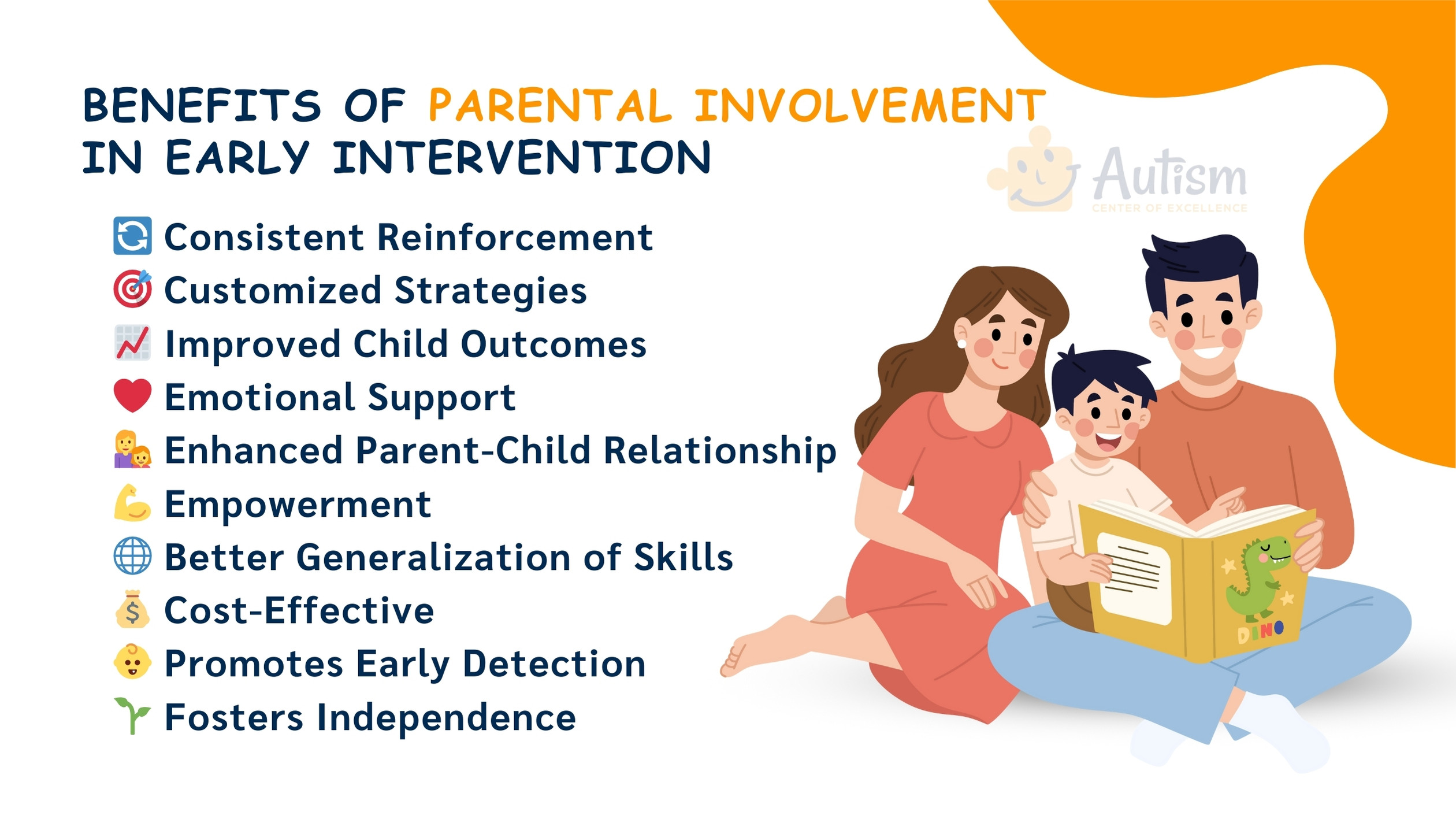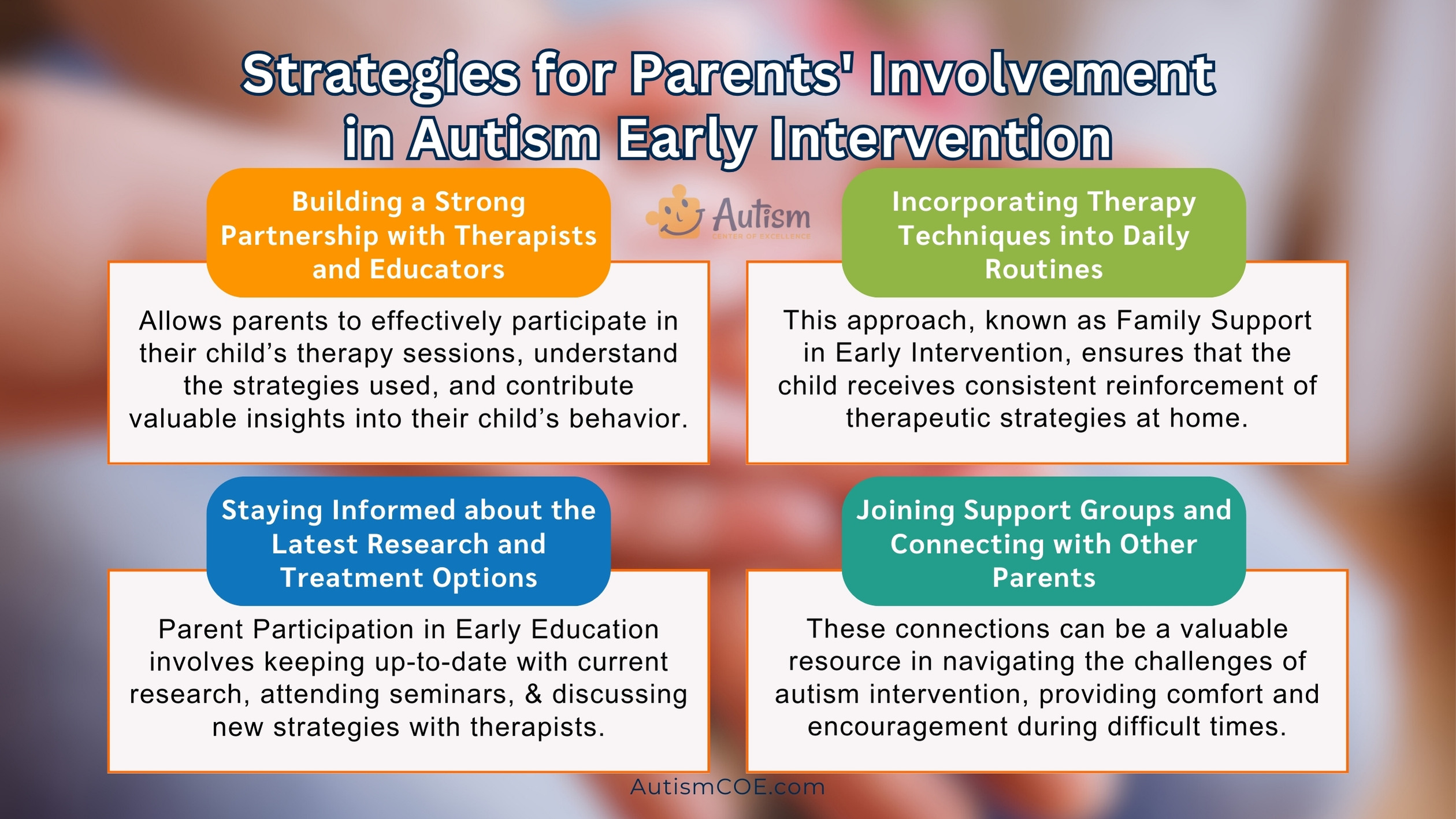Parental participation in early intervention programs is the factor that molds the path of a child’s development. Especially for children with Autism Spectrum Disorder (ASD), these early interventions really matter. We will particularly focus on the role of parents in these programs, and in this context, Parental Engagement in Early Childhood Interventions will be examined. Not only the advantages of such participation on the child will be discussed, but also, the family support for early intervention is a must. However, as we go further into the topic, we will see that parents are not just bystanders in the process of their child’s growth but important players who could positively affect the progress of their child.
Understand Parent Involvement in Child’s Development
Parents are the key caregivers in a child’s life and the most stable person in their life, which places them in a unique position to support and reinforce therapeutic techniques. Parents attending their child’s Early Intervention Programs actively, are able to use the acquired teachings in a consistent manner, thus creating an environment for growth and progress.
In addition, their close familiarity with their Child’s Behaviors, strengths, and weaknesses allows them to tailor strategies to meet their child’s needs. Hence, parent involvement goes beyond mere involvement; it is all about preparing parents to be proponents and educators for their children, creating a caring environment to help their children’s growth and development.
Parents as First Teacher in Early Intervention
Within the domain of early intervention, parents are commonly regarded as the baby’s initial educator. This position is not only significant but also extremely potent. The relationship between parents and their children is more intense and active, and communicative than the one with any professional. They are there for the first words, the first steps, the victories, and the difficulties, and so on. This sequential engagement creates innumerable teaching and learning moments. Parents can Practice relevant therapeutic strategies through the daily routines as consistent Reinforcement of Skills supporting generalization and mastery.
In addition, parents are able to modify these strategies for their child’s individual pattern of learning which increases their effectiveness. So, in Early Intervention, parents not only teach, they mold the child’s learning environment by making every interaction a learning experience.

Benefits of Parental Involvement in Early Intervention
When parents are engaged in their child’s interventions, they become key allies to the process and can largely influence their child’s success. Advantages of parent participation in early intervention include;
Consistent Reinforcement
Parents can support Therapeutic Strategies at Home, which would allow for consistency, which is difficult to provide in the clinical setting due to limitations in sessions.
Customized Strategies
The insight parents have into their child permits them to personalize interventions to their child’s individual needs and learning style, making the interventions more successful.
Improved Child Outcomes
Studies indicated that when the parents take active roles in early interventions, the developmental outcomes are favorable in children with autism.
Emotional Support
Active participation allows parents to give Emotional Support by comforting their child during therapy sessions, hence, reducing anxiety and increasing participation.
Enhanced Parent-Child Relationship
Parental involvement in early intervention as an effective process can reinforce the parent-child relationship when the parent becomes more aware of their child’s needs and modes of communication.
Empowerment
Active participation ensures that parents have the power to ask for their child’s needs in diverse situations such as school and community settings.
Better Generalization of Skills
Skills learned in therapy sessions are most liable to be generalized to other settings if they are regularly practiced at home under the guidance of the parents.
Cost-Effective
Parent carried strategies at home reduce the need for intensive professional services, making early intervention more cost-effective.
Promotes Early Detection and Intervention
Parents who take an active role are also more likely to detect the early signs of Developmental Delays or disorders, and therefore, early intervention can be implemented with the possibility of better outcomes.
Fosters Independence
By practicing every day at home, children can become self-sufficient in every-day activities, thus, promoting their self-confidence and independence.
Join Our Weekly Newsletters!
Subscribe now to stay updated with our latest email updates.
Role of Parental Involvement in Early Intervention for Children with Autism
Parents’ involvement is important in ensuring the milestones of any early intervention program. Let’s discuss the four important roles that parents play in early intervention for children with autism and how they can support their child’s development.
✅ Active Participation in Therapy Sessions
Therapy sessions for children with autism are influenced greatly by their parents. The active involvement in these sessions can improve their efficiency. In viewing and obtaining a hands-on experience, parents are able to learn the School Readiness and ABA Therapy therapeutic methodologies used by professionals and how to implement them at home. Such ongoing support helps the child to internalize the skills and generalize them faster. Moreover, the existence of a well-known face can be an emotional rock to the child, hence therapy appointments will be less stressful and more productive.
✅ Creating a Supportive Home Environment
A supportive home atmosphere also is one of the functions, which parents perform. It entails setting up the home environment in such a way that it creates learning and development. For example, parents can use visual schedules, set up routines, and use Sensory-Friendly furniture and toys. They may also incorporate therapeutic interventions into daily activities, making mealtime, playtime, and bedtime as vehicles for learning and development.
✅ Collaboration with Therapists and Educators
The coöperation with Autism Therapists and educators is needed to ensure a unified approach towards the child’s development. Parents may tell the professionals about the behavior, strengths, and challenges of their child, which helps the professionals to adjust their approaches more efficiently. Communication on a regular basis also ensures that everyone knows where the child is about the progress and the next steps.
✅ Advocacy for the Child’s Needs
Parents are the most ardent supporters of their children. They struggle for the rights of their child, making sure that they get the required services and accommodations. Parent Advocacy in Early Intervention goes beyond the home to school and community settings. Understanding their child’s needs and the laws of Special Education and disability rights will enable the parents to provide their child with every possible chance to flourish.

Strategies for Parents in Autism Early Intervention
Autism is a complicated, multi-faceted, and rather complex neurodevelopmental disorder that generates significant challenges for the diagnosed child and the families. Despite the complexity of these issues, the early intervention can be a life changing factor for their quality of life. One of the most often overwhelming feelings for a parent of an autistic child is not knowing where to begin the search for Early Intervention Services. Moreover, there are a number of approaches that can help you in your way of supporting your child’s development.
A. Developing an Effective Collaboration with the Therapists and Educators
Parental Engagement in Early Childhood is central to the success of early intervention services. A solid collaboration is developed with therapists and educators, helping parents to actively take part in their child’s therapy sessions, comprehend the methods used, and offer useful inputs related to the child’s features. This dual partnership not only improves therapy outcomes but also makes parents advocates for their children.
B. Incorporating Therapy Techniques into Daily Routines
Fusing the techniques of therapy into everyday activities is one of the most successful strategies for parents. Family support of early intervention helps in providing the child with continuously Reinforcement of Therapeutic Strategies at home. For example, dinner time, play time and bed time can be converted into learning and development. This approach highlights the Role of Parents in Child Development and promotes the ability of children to transfer skills to other settings.
C. Keeping up to Date on the Most Recent Research and Treatment Options
Because the research on autism is dynamic, parents should continue to learn about the latest treatment options. Parent Participation in Early Education is based on current research, attending workshops and seminars, and constant discussion of new treatments or strategies with professionals and educators. This participation helps parents to make decisions about what should be in their child’s intervention plan.
D. Joining Support Groups and Connecting with Other Parents
Family Centered Early Intervention Services emphasize the role of the community in providing the support. Getting involved in support groups and getting connected to other parents of children with autism can provide not only emotional support but also practical guidance and a feeling of being a part of something. They are valuable tools for parents of children requiring autism early intervention and provide them with moral support during hard times.
Frequently Asked Questions & Answer
Why is Parent Involvement Important in Early Intervention?
The parent’s role is crucial in the early intervention process for it drives the effectiveness of therapeutic approaches and provides continual reinforcement to the child. Parents are usually the most consistent figures in a child’s life, and through their active involvement, skills can be transferred to other settings. Moreover, parents can share details about their child’s responses, strengths, and obstacles that therapists may miss during the sessions.
What is Parent Mediated Intervention?
The Parent-Mediated Intervention is a technique that involves parent training in order to deliver therapeutic interventions to their children. The objective is to enable parents to facilitate the development of their child in routine. This approach ensures consistent implementation of Therapeutic Techniques beyond therapy sessions, which enables children to generalize and practice acquired techniques.
What is Father Involvement in Early Childhood Education?
Father participation in Early Childhood Education is the involvement of fathers in their child’s learning and development process. This could include many things such as reading to the child, playing with the child, helping with the child’s homework, or going to parent-teacher conferences. It has been proven that father participation will have a positive effect on the cognitive and Social Development of the child.
Can a Child with Autism be Normal?
“Normal” is subjective and can be interpreted differently by different people. Autism children, just as any children, have their own strengths and weaknesses. Autism is a spectrum disorder, and people with autism have a variety of abilities and features. Early intervention and the right support are what make children with autism live a full life. It is crucial to identify each child’s potential instead of contrasting them with the typical Developmental Milestones.
Conclusion
Parents play a crucial role in the early intervention of autism in children. With a strong partnership with therapists and educators and an active integration of therapeutic strategies into daily living, this path is doable. We here at AutismCOE place great trust in parents as our invaluable partners in this process and it’s our mission to provide them with all the information, tools, and assistance. Remember, all children have their own potential and with proper encouragement and affection, they can be strong and lead happy lives.
Must Read – Unit 11: Parental Involvement in School Readiness: A Crucial Factor for Your Child’s Success
Please Note: The content of this blog is for informational purposes only and should not be considered a substitute for professional medical advice, diagnosis, or treatment. Consult a qualified healthcare professional for personalized guidance tailored to your specific situation.

Bhavika Bhasin
Bhavika Bhasin is the Research and Marketing officer at AutismCOE. She works with children and adults with ASD. Her clinical research includes evaluating various available autism screening and diagnosis methods and their efficacy. She is currently developing a novel screening exam that is indicated to be more accurate than the existing available exams. She is also writes articles papers for various publications.


